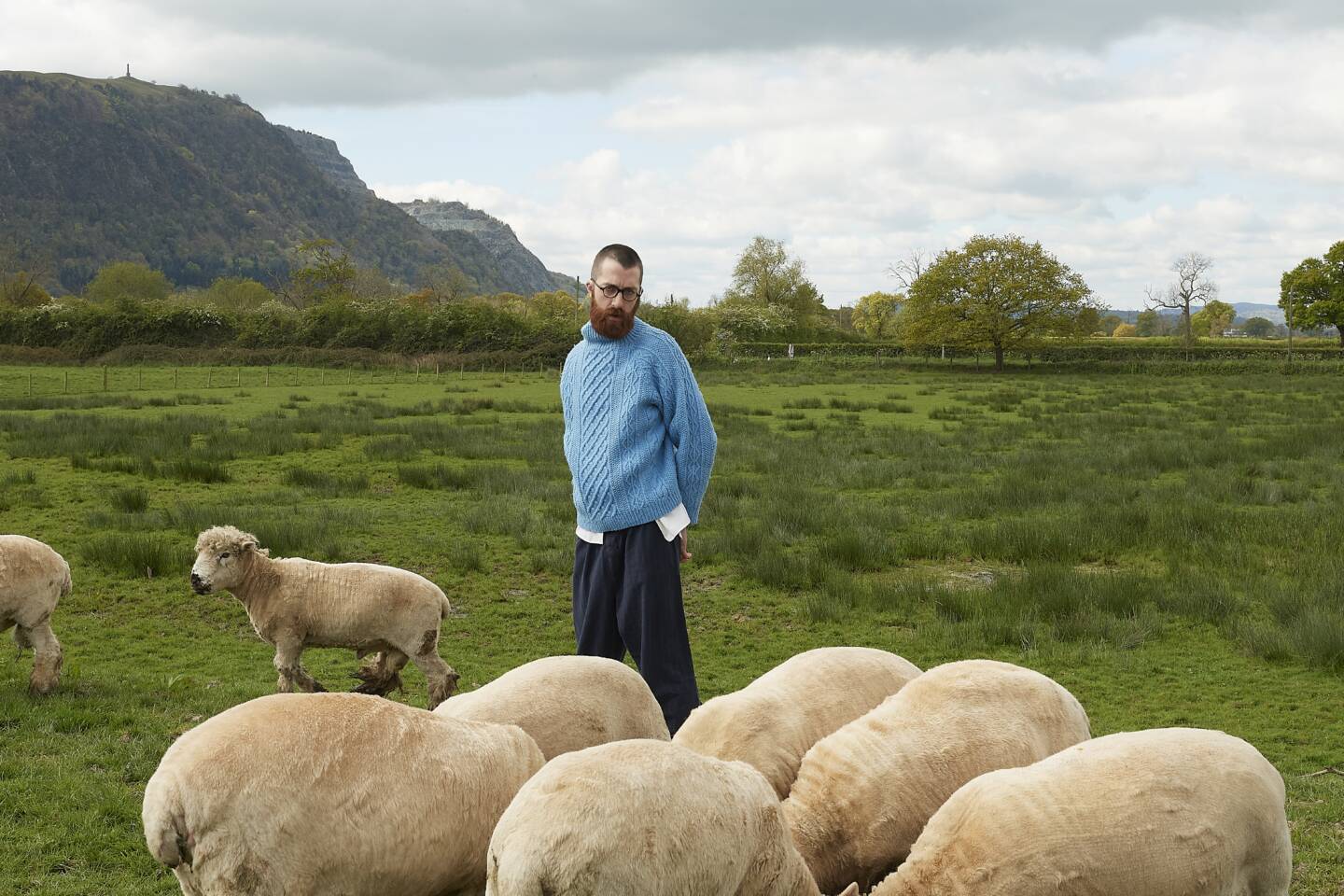Absurdist and angular, unexpected and allegorical, Jerskin Fendrix isn’t a persona or a character: it’s just him – but maybe more so.
With a Cambridge degree, a lofty side-hustle writing Oscar-nominated scores for the world’s premier surrealist auteur, you may be expecting something haughty and inaccessible from Jerskin Fendrix’s second album. From the title onwards he disabuses you of that notion: Once Upon A Time… In Shropshire is a love letter to something that once existed – a shining, rose-tinted childhood and the lives that made it. In his words, “10 Folk Songs about Life & Death in the Countryside”.
It took years to capture. Long, difficult years weighted with loss. : there are gang vocals of old friends yelling a childhood song into the night; there is the single artwork for Jerskin Fendrix Freestyle that has your hero covered in literal (not literal) shit. It posits that grief is complex and memory is intoxicating – and that Shropshire can contain the entire world.
Fendrix scored plays for his friends, including a version of Alfred Jarry’s Ubu Roi that they later put on at the V&A with Fendrix’s music alongside it. He also joined a band, Famous, helmed by Jack Merrett, and travelled up to London to play gigs at the Windmill Brixton, a fertile breeding ground for artists more interested in creative experimentation than follower numbers and brand
deals. One day, the opening act didn’t turn up so Jerskin Fendrix played his first solo gig, showcasing songs he’d been writing for himself.
In 2020, Fendrix released his debut album, Winterreise, a mad sort-of breakup album named for the mad sort-of breakup Schubert song-cycle. This brought him to the attention of Yorgos Lanthimos who was beginning work on Poor Things.
The resulting work is sometimes eerie, unsettling and difficult but wholly perfect for the film. A fruitful creative partnership was born: Fendrix also scored Lanthimos’ follow-up, Kinds of Kindness, and is currently working on his next project, Bugonia.
Fendrix was working on Once Upon A Time… in Shropshire between film scores. Switching between modes was fulfilling but also a little intense. “When you write a song, it has to be self evident, stand up, justify itself. There’s a lot of pressure on it. So writing scores for someone else’s story – it’s a great exercise in empathy. I was furnishing these other characters’ emotional journeys. So it’s a really different way of thinking.”
All of which to say: it took a while to give the follow-up to Winterreise the attention it deserved, what with Hollywood on the phone and the pressure Fendrix put on himself – and what was going on in his life at the same time: “People kept dying as I kept writing,” he says. “So I kept writing.”
It’s a record about loss, but not exactly. It’s an album coloured by grief, but not exactly. “To some extent it’s a very loving testament to what that place was like,” he says of trying to evoke, essentially, what it was to grow up as Jerskin Fendrix with Jerskin Fendrix’s friends and family in the place where Jerskin Fendrix became himself. “It’s not a sad thing. It’s trying to capture that place and how important that was to me- and then how, bit by bit, it gets corrupted.”
The sweet flush of first love and rampant 2000s cultural references colour Beth’s Farm, a song that’s punctuated with twinkles that occasionally warp like your memory reaching for something you can’t quite recall.
From the drum-kit-falling-down-a-flight-of-stairs ending of Princess to the skittering huskiness of SK2, from the energy-drink-fuelled big band energy of Jerskin Fendrix Freestyle to the deep, tired sadness of album epilogue Last Night In Shropshire, Once Upon A Time… In Shropshire feints in one direction then dashes in another.
When he finished writing the record in 2023, Fendrix then had to spend weeks recording, alone: “It was difficult. There were vocal takes where I was just sobbing.”
The Universe is the heart of the album and you can hear Fendrix on the cusp of shattering in its vocal line. In his deep baritone, Fendrix weaves an adolescent world of house parties, “getting ratted in the kitchen” and hours spent away from his phone because “everyone I love is here”. Then, in keening falsetto, it switches focus – a voice looking upward, “Will you stay till the morning or will you leave first?” The raw vocal cracks, pleading: “Are you feeling better? Are you feeling worse? Are you still alive somewhere in the universe?”
Fendrix’s voice shifts perspective constantly on the record – Jerskin as a child; as a teenager; as his friends; as a woman; performing an imagined conversation between his parents; as death; as people telling him to shut up.
Of course, death stalks the songs, but just as often with a clown mask on as with a cowl and scythe. “Art is often so one dimensionally geared towards death,” he says. “Death is really, really, really complex. . Sometimes it can be funny, and sometimes it’s kind of trivial, or relieving, or infuriating. I needed it to have all of that.”
What is life, if not a series of having things and then losing them? Jerskin Fendrix’s Shropshire doesn’t exist anymore: and yet it does, captured forever in beautiful, complex, hilarious, infuriating, fervent, sun-dappled songs.


